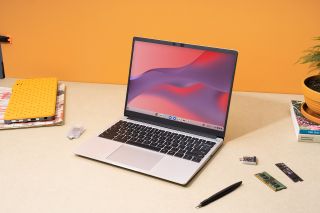Framework Embraces ChromeOS with Chromebook Edition Laptop
With all of the same repairability of the Windows and Linux versions.

Framework, which makes the ultra-customizable Framework Laptop with a completely replaceable mainboard and expansion modules for different ports, is moving to a new type of laptop: the Chromebook.
Starting today, Framework is accepting pre-orders for the Framework Laptop Chromebook Edition, which still starts at $999 and will ship in early December.
In a release, Framework said that the laptop will run on a 12th Gen Intel Core i5-1240P with 30 watts of sustained performance. The prebuilt version comes with 8GB of DDR4 RAM and 256GB of NVMe storage and can be upgraded to up to 64GB of RAM and 1TB of storage. The company hasn't said what kinds of upgrades may be available in the future, but a representative said that all of the current expansion cards are cross-compatible between the Framework Laptop and the Chromebook Edition.
Most of the Framework Laptop we already know isn't going to change in the Chromebook Edition, including the 3:2 display, Intel 12th Gen P series processors, magnetic bezels, and hardware switches to cut access to the microphone and camera. It remains easy to upgrade and replace parts, including socketed RAM and storage, as well as QR codes that link to repair guides.


There are a few differences. The biggest is actually that the keyboard layout on Chromebooks differs from what you find on a typical Windows laptop. For instance, there are longer Control and Alt keys, which means there are longer cutouts. It's unclear what kinds of options Framework will offer to customize that layout.
Additionally, Framework says that battery optimizations from Google and Intel should provide for even longer battery life. That's good, because we found that the Windows version had middling battery life.
The Chromebook will also use Google's Titan C security chip, and the company claims the laptop will get automatic updates for "up to eight years."
I see this laptop as a great possibility for schools. Changing out mainboards every few years for more ChromeOS updates will likely save school districts from buying new fleets of laptops. That being said, those same school districts may have bulk deals with companies like HP, Dell or Microsoft. While Framework has proven itself by making more than one generation of its flagship product, it's not exactly a well-known entity, especially outside of the enthusiast tech space.
We haven't tested it, but having seen the latest Windows version, we have high hopes. Will as many DIYers want Chrome? Possibly, especially for those who want simplicity or are handing a device to a kid. But there’s no arguing that $999 (to start) is a lot of money for a Chromebook when there are plenty of (admittedly far less repairable or powerful) options available less than a fifth of that price.
Stay on the Cutting Edge
Join the experts who read Tom's Hardware for the inside track on enthusiast PC tech news — and have for over 25 years. We'll send breaking news and in-depth reviews of CPUs, GPUs, AI, maker hardware and more straight to your inbox.
Andrew E. Freedman is a senior editor at Tom's Hardware focusing on laptops, desktops and gaming. He also keeps up with the latest news. A lover of all things gaming and tech, his previous work has shown up in Tom's Guide, Laptop Mag, Kotaku, PCMag and Complex, among others. Follow him on Threads @FreedmanAE and Mastodon @FreedmanAE.mastodon.social.
-
cyrusfox Looks great but how big is the market for high spec chromebooks??? Think its too premium and that market was served by the Pixelbook (8th gen Intel, looks like even Google knows this market doesn't exist). Chromebooks biggest selling point is price and simplicity. I picked up a clearance lenovo "11.6 with N4050 I think for $70, touchscreen. At that price it was a steal and it works great (Web, media, office, andorid emulation). at the $400 plus market I see the market rapidly shrink to 0, who would pay $1000 for chrome OS device?Reply -
BillyBuerger One of the things I felt framework made a mistake on with their design was using an island style keyboard. This limits the possible arrangements of the keys. As we see here, they had to make a whole different case for the laptop just to have a different key configuration for Chrome compared to windows. If they would have left the keyboard area open, they could have fit any keyboard layout in there as needed. This would be awesome for people who like other non-standard layouts like ortho/grid or even some sort of ergonomic arrangement. That would be awesome if there was way to build out your own keyboard for your laptop. But their choice makes that impossible without cutting things.Reply -
bmbmbmbm Reply
The ChromeOS keyboard is exactly the same as Windows, just the glyphs (logo on each key) are differentBillyBuerger said:One of the things I felt framework made a mistake on with their design was using an island style keyboard. This limits the possible arrangements of the keys. As we see here, they had to make a whole different case for the laptop just to have a different key configuration for Chrome compared to windows. If they would have left the keyboard area open, they could have fit any keyboard layout in there as needed. This would be awesome for people who like other non-standard layouts like ortho/grid or even some sort of ergonomic arrangement. That would be awesome if there was way to build out your own keyboard for your laptop. But their choice makes that impossible without cutting things. -
BillyBuerger Reply
They indicated that the Ctrl and Alt keys are larger since there is no Windows key or apparently a Fn key between them. You can see this in the image.bmbmbmbm said:The ChromeOS keyboard is exactly the same as Windows, just the glyphs (logo on each key) are different
Most Popular

